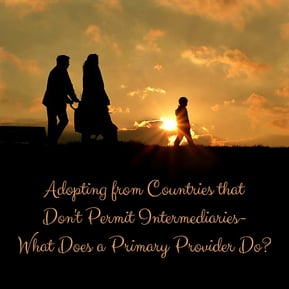Written By Family Connections, Inc., a Primary Provider for Pakistan
Intercountry adoption is a complex process that requires the coordination of professional adoption services to ensure the welfare of children and the proper transfer of custody of an orphaned child to adoptive parents. Adoption Service Providers in the United States must meet high standards of professional conduct under the Hague Convention on the Protection of Children and Cooperation in Respect of Intercountry Adoption. The U.S. Universal Accreditation Act of 2012 (UAA; effective July 14, 2014) requires all U.S. Adoption Service Providers to be Hague Accredited by the Council on Accreditation or to be supervised by a Hague Accredited agency to ensure adherence to ethical standards of practice and to protect children and adoptive families.

The Hague Convention on the Protection of Children and Cooperation in Respect of Intercountry Adoption and the Universal Accreditation Act requires all intercountry adoptions be supervised by a Primary Provider. A Primary Provider is a Hague Accredited Adoption Service Provider who is responsible to provide or verify the provision of the required six adoption services as indicated by the Hague Convention on the Protection of Children and Cooperation in Respect of Intercountry Adoption. The required six adoption services with all intercountry adoptions are:
- Identifying a child for adoption and arranging an adoption
- Securing the necessary consent to termination of parental rights and to adoption
- Performing a background study on a child or a home study on a prospective adoptive parent(s), and reporting on such a study
- Making non-judicial determinations of the best interests of a child and the appropriateness of an adoptive placement for the child
- Monitoring a case after a child has been placed with prospective adoptive parent(s) until final adoption
- When necessary because of a disruption before final adoption, assuming custody and providing (including facilitating the provision of) child care or any other social service pending an alternative placement.
There are foreign countries that not do not permit intermediaries - U.S. accredited and approved Adoption Service Providers - to provide adoption services or to supervise others providing adoption services. For example Ukraine, Jamaica, Afghanistan, and Pakistan disallow adoption service providers. In each of these countries adoption services are provided by public government authorities or competent authorities which is a court or governmental authority that has jurisdiction and authority to make decisions in matters of child welfare, including adoption. For example:
- The Ukrainian national governing entity responsible for intercountry adoption is the Department for Families and Children (DFC) in the Ministry of Social Policy and regional courts near the child’s residence are responsible for the judicial process for adoption. The Department for Families and Children registers children eligible for adoption, accepts prospective adoptive parents, proposes child-family matches, and coordinates the adoption process.
-
The Jamaican public authorities are the Adoption Board managed by the Jamaican Child Development Agency (CDA). The CDA accepts, processes and assesses all applications for adoption and the Adoption Board reviews each case and is the only body that is authorized to approve the adoption of children.
-
In Afghanistan and Pakistan the Family Courts (competent authority) are responsible for guardianship proceedings regarding the placement of children for consideration for adoption in the United States. Non-government facilities in these countries may hand over a child to prospective adoptive parents for consideration but these facilities have no legal, regulatory, or judicial authority to place a child for adoption. This handing over of the child allows adoptive parents time to get to know the child and have the child evaluated by a medical professional. This culturally accepted practice improves outcomes for the child and family by lessening the time a child spends in an orphanage and by increasing the amount of parental care and family bonding. However, the Family Court judge is the entity who decides if this child or any child will be placed into a prospective adoptive family for adoption. Only the competent authority - Family Court - can provide adoption services one through four as indicated above and legally place a child for adoption.
The Universal Accreditation Act of 2012 requires all prospective adoptive parents who are choosing to adopt a child from a foreign country employ a Primary Provider even when adopting a child from a country that does not permit Adoption Service Providers. The Primary Provider must be licensed/authorized as an adoption agency in their state of operation and have achieved Hague Accreditation from the Council on Adoption. For adoptions in countries that disallow intermediaries, the Primary Provider is responsible for:
- Developing and implementing an Adoption Services Plan that details the provision of all six adoption services. The Adoption Services Plan would indicate which adoption services will be provided by the foreign country’s public government authority or competent authority and which services will be provided by a U.S. Adoption Services Provider.
- Supervising adoption service providers within the United States. For example, families choosing a Primary Provider not licensed/authorized in the State of their residence will require an Adoption Services Provider within their state to complete their home study investigation and post-placement supervision (if required). This in-state Adoption Services Provider for the home study and post-placement supervision must be supervised by the Primary Provider.
- Ensuring that all six adoption services are provided consistent with applicable laws and regulations. The Primary Provider is responsible to ensure that all adoption services are provided and must verify the provision of such services. The Primary Provider is not required to provide supervision or to assume responsibility for services provided by the foreign country’s public government authority or competent authority. In countries that do not permit intermediaries, the foreign country’s public government authority or competent authority will (a) identify a child for adoption and arrange the adoption, (b) secure the necessary consent to termination of parental rights and to adoption, (c) perform and report on a background study on a child (as per foreign country practice), and (d) make non-judicial determinations regarding the best interest of the child and the appropriateness of an adoptive placement.
- Provision of adoption services or supervision of the provision of adoption services that are not provided by the foreign country’s public government authority or competent authority. In all adoption cases, the Primary Provider will either conduct the home study investigation for the prospective adoptive family or supervise an Adoption Services Provider in the family’s state of residence to complete the home study investigation. In cases where the foreign country’s public government authority or competent authority releases or gives guardianship of a child (not a full and final adoption in the foreign country) to a family for adoption in the United States, the Primary Provider will also be responsible to monitor the case after a child has been placed with prospective adoptive parent(s) until final adoption (typically accomplished by post-placement supervision visits/reports) and when necessary because of a disruption before final adoption, assuming custody and providing child care or any other social service pending an alternative placement. For example, Pakistan, Afghanistan, and Jamaica do not provide a full and final adoption in the country of origin and require the child to be adopted in the United States.
- Provision of legal counsel to obtain evidence and/or to advise the prospective adoptive family regarding the compliance of the evidence regarding the child’s orphan status in relation to US Citizenship and Immigration Services requirements and the Universal Accreditation Act regulations. Legal counsel will collaborate with the prospective adoptive parents’ in-country attorney and/or facilitator. This service is not required of the Primary Provider by the Hague standards or U.S. government laws or regulations but may be provided to protect the integrity of the adoption process. Family Connections, Inc. requires these services in all Pakistan and Afghanistan cases in which the adoptive family engages the agency’s Primary Provider services.
- Other services under the Hague accreditation standards, such as the training of prospective adoptive parents, monitoring post-adoption supervision reporting (if required), and informing the Department of State and country of origin of any disrupted or dissolved adoption.
Primary Providers providing services for prospective adoptive families adopting a child from a foreign country that does not permit intermediaries are required, at a minimum, to provide the five services listed above. Some Primary Providers providing services in these foreign countries choose to provide additional support services for prospective adoptive families. These agencies may describe themselves as Primary Providers with an Adoption Program in the country of origin. These additional support services may include, but are not limited to, dossier preparation, in-country facilitator services, arrangement of flights and lodging, and scheduling of adoption-related appointments. The Primary Provider would locate, hire, and pay the in-country facilitator. In-country facilitator services typically include (but are not limited to) (a) coordination of family travel within the country, (b) ensuring that the family participates in all adoption-related meetings with foreign government representatives and U.S. Embassy officials, (c) translation services and/or arrangement of translation services, and (d) supporting the attainment of the child’s birth certificate, adoption documents, passport, and US Visa. Please know that no Primary Provider with or without an Adoption Program in a foreign country that does not permit intermediaries may identify a child for adoption, arrange an adoption, secure the consent to termination of parental rights and adoption, preform a background study on a child, or make determination regarding the bests interests of a child and the appropriateness of an adoptive placement. Only public foreign authorities or competent authorities in the country of origin can provide these adoption services. Thus Primary Providers who have Adoption Programs in such countries cannot refer a child to a prospective adoptive family, hold a child for a family, match a child with a family, or place a child into an adoptive family. Primary Providers with Adoption Programs can only provide the five services listed above and support services as summarized.
Prospective adoptive families who wish to adopt a child from a foreign country that does not permit intermediaries are required to engage a Primary Provider. The choice of Primary Provider is determined by the family and their wish for/need for specific services to support their adoption.



Let Us Know What You Thought about this Post.
Put your Comment Below.